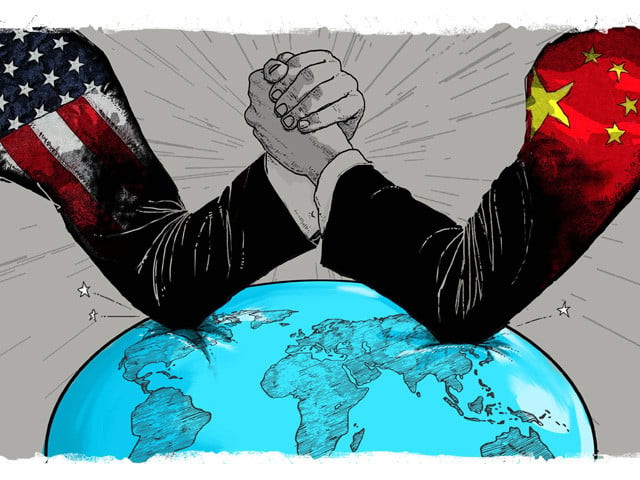Reflecting on the Peloponnesian War between Athens and Sparta, Greek historian Thucydides, noted ‘the rise of Athens provoked fear among Sparta, making war inevitable’. A contemporary observation has been made by American writer Graham Allison:
“When one great power threatens to displace another, conflict is unavoidable – if America and China do not exercise prudence, they may blunder in to a conflict.”
America’s global ascendancy was reinforced by the Soviet collapse and the Japanese economic crises of the 1990s, resulting in a ‘unipolar moment’ that is now being challenged by China. Sino-American relations are complex; the economies of both countries are deeply linked, their supply chains intertwined and they are each other’s principal investment partners. China is America’s primary supplier of consumer goods, medical supplies and pharmaceutical products. ‘Chimerica’, a term coined by British historian Niall Ferguson, is a defining characteristic of the modern globalised economy.
China’s phenomenal economic growth has allowed it to accumulate financial power it can leverage to project influence externally. This is evident from the Belt and Road Initiative which will align much of Eurasia’s economy with China through the construction of ports, highways, railways and energy projects. Investment can be transformed into geopolitical influence – apparent from the tilt of pro-US countries such as the Philippines, Lebanon, Bangladesh and Pakistan towards China. China is Africa’s largest trading partner, with $153 billion loaned for various projects. Chinese trade and investments in South America have quadrupled, especially in countries like Panama that were once considered America’s backyard. Multilateral institutions are increasingly coming under Chinese influence. Despite an American boycott, 102 countries queued up to join the Asia Infrastructure Investment Bank and the Silk Road Fund in 2015. This is compounded by Chinese domination of rare earth metals and the global shipping industry. Gauging by the statements of various leaders in the developing world, it seems to me that many view China’s impressive growth with admiration and are dismayed by the discord and disarray in the American political system.
Economic power can be converted to military power, and China is on the path towards becoming the dominant military power in the East Pacific by 2050. Chinese plans envision a modern air force, blue water navy and long-range missiles that can challenge the US in the South China Sea. China’s first overseas base was established in Djibouti, and reports of bases in Equatorial Guinea have rattled American strategists.
According to American author Robert Kaplan, Chinese strategists view the South China Sea the way American tacticians saw the Caribbean in the 19th century; a “blue water extension of their land mass – controlling it would allow them to venture in to and command the Pacific, the same way the domination of the Caribbean enabled the US to influence the Western Hemisphere”. The Chinese believe that the US wishes to retain its hegemony and will resort to offshore balancing to thwart China, naval blockades at Straits of Malacca or even encourage pro-autonomy movements in Hong Kong. Taiwan has long been a contentious issue between the US and China.
China has territorial disagreements with India, Japan, Vietnam, Philippines and Indonesia. Taking advantage of these, the US has responded with its own initiatives. The establishment of the ‘Quad’, a partnership consisting of the US, India, Australia and Japan is evident. Also discernable is the formation of AUKUS, the British and American outreach to Australia, with emphasis on developing nuclear submarines for Australia. Over the next decade, the US military will deploy more assets to the Pacific as part of the US pivot to Asia. Hawkish American policymakers now regard China as a revisionist state that seeks to restore its influence in East Asia. This assessment may not necessarily be accurate, but as the saying goes, perceptions are more important than reality. Not all observers view China with a pugnacious lens – Professor Mahbubhani of the National University of Singapore points out to China’s exceptional ties with Central Asian countries as an example of why presumptions of Chinese antagonism are over exaggerated
Culturally, the US retains its edge as the home of Hollywood and Silicon Valley and increasingly, EU states are hesitant over closer ties with Beijing. Yet, America’s primacy and the stability it imposed as a consequence of its global hegemony is being eroded. China has emerged as a continental-sized rival; something American presidents didn’t imagine decades ago, and a new Cold War 2.0 has begun. This struggle for primacy inevitably compels a shift from cooperation to competition, with emphasis on national security and strategic interests. Mutual cooperation or the resolution of international disputes will become less likely, with each side vying to thwart the other for fear of loss in dominance. This is evident from China and the US vetoing each other’s motions in the UN Security Council. Economically, the US is now decoupling from China and looking for alternate supply chains.
In my opinion, we are moving from a ‘stable liberal international order’ to an era of geopolitical rivalry and near bipolarity dominated by great power politics between the US, backed by India, Australia, Japan and the Europeans – and China, backed by Russia, Iran and North Korea. Unfortunately, this comes just as the looming climate crises materialises. Till recently we could have debated various outcomes; perhaps both countries could arrive at a détente or carve out spheres of influence. As Kissinger suggested, the US could accommodate China’s rise and the latter would assuage the concerns of its neighbours. However, this scenario is now implausible and the US is going to create security alliances to contain China. The rivalry between the two will be the negative organising principle of geopolitical competition, one that will inevitably spill into other theatres.



COMMENTS
Comments are moderated and generally will be posted if they are on-topic and not abusive.
For more information, please see our Comments FAQ